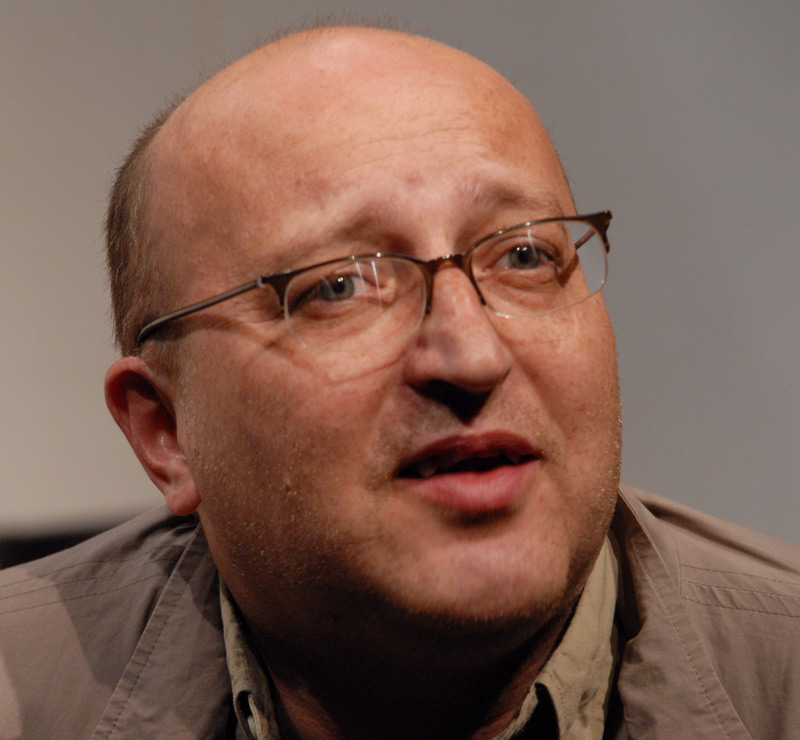about the production
According to theatre critics, the production of Chekhov’s Ivanov belongs to the top events of the 2005/2006 season not only within the activity of Martin theatre but also in Slovakia generally. Director Roman Polák succeeded in producing a unique interpretation key and offered a new view on Chekhov as the author of the clash of multicultural socio-political and religious contexts.
The climate for introducing Chekhov is traditionally very favourable in Martin. The profile of being a “Chekhov´s” theatre was introduced for the first time in 1979 when the legendary production of The Cherry Orchard directed by Ľubomír Vajdička was presented, in which the “backstage” – the lower current of Chekhov poetics was shown and presented in a modern tragicomic light. Almost thirty years later there is again another non-standard, theatrically daring interpretation of Chekhov, which is, however, based on the very essence of his work.
Polák does not rewrite Ivanov, to the main hero he only adds the attributes of a modern thirty-something man living in the present-day hectic world. We see Ivanov´s life crisis, the so-called burn out syndrome, which according to statistics affects more than a half of his generation. Polák managed to create an atemporal production, a piece of directorial invention, brilliancy of acting and ambivalence of meaning; a piece exclusively theatrical, which asks fundamental questions such as Who am I? and What do I want? by means of slapstick comedy, and which oscillates between burlesque comedy and sharp tragedy.
Surrounded by grotesque figures in padded clothes and figures as if from the Japanese “bunraku” theatre, faltering Ivanov is gradually being crushed by states of depersonalisation. He cannot free himself either by the memory of childhood depicted as a boy with a balloon, or by threatening dummies that wait for his last step like time bombs, or endless devotion and love of two women – the wife and the lover. It is impossible to express his mental, emotional and physical exhaustion by the way of a word. The labyrinth of possible interpretations is hinted at by the stage design based on the essential spiral or the Jin-Jang principle. The contrast between black-and-white visualization and colourful inner perceiving makes the production the piece of extraordinary experience.
Vladislava Fekete
creators
directed by Román Polák
translation: Ján Štarsser
dramaturg: Monika Michnová
set: Vladimír Čáp
costumes: Peter Čanecký
puppets: Ludvík Pozníček
music: Michal Novinski
choreographic co-operation: Balázs Eros, Máté Gáspár
consultations: Beata Leichtová (Jewish Religious Community in Bratislava), Alena Mažgutová (Psychiatric Clinic), Masahiko Shiraki
characters and cast:
Nikolai Alekseyevich Ivanov: Miloslav Kráľ; Sara: Renáta Rundová; gcount Matvey Semionovich Shabelskiy: Ján Kožuch; PPavel Kirillych Lebedev: Michal Gazdík; Zinaida Savishna Lebedevova: Jana Oľhová; Sasha: Lucia Jašková; doctor Lvov: Marek Geišberg; Marpha Yegorovna Babakinova: Eva Gašparová; Kosikh: Viliam Hriadel; Mikhail Mikhailovich Borkin: František Výrostko; Avdotya Nazarovna: Petronela Valentová; animators: Jana Eliášová, Bibiana Tarasovičová, Jozef Abafi, Ján Demko
director

Roman Polák (1957)
In 1984 he started to work in the Martin theatre – today’s the Slovak Chamber Theatre - where he acted as artistic director from 1988 to 1990. His productions Touches and Connections (1988) by P. de Marivaux and Brecht´s Baal (1989) represented Czechoslovakian theatre at international festivals throughout Europe (festivals in Wrocłav and Toruń in Poland, BITEF in Beograd, Edinburgh), the production Touches and Connections was awarded prestigious The Guardian Critics´ Choice.
In 2000– 2002 he worked as artistic director of the Drama Ensemble of the State Theatre in Košice and at the same time he staged for the opera Puccini´s Tosca and Mozart’s Don Giovanni. From 1990 he has co-operated with the Astorka Korzo ´90 Theatre, firstly as a guest director, later as an inner director and from 2005 as artistic director. Unforgettable is his Russian tetralogy staged at the Astorka: Chekhov´s Uncle Vanya (1995), Ostrovsky´s The Forest (The awards for the best production and the best direction – DOSKY 1997), Gorky’s Scenes from the House of the Bessemenovovs / The Petty Bourgeois (The award for the best production – DOSKY1998) and The Axe Murder in St. Petersburg based on Dostoyevsky’s Crime and Punishment (1999). In April 2006 he became managing director of the Drama Ensemble of the Slovak National Theatre.
Materials available
Script of the production: EN
If you are interested in these materials, write to archivy@nitrafest.sk
